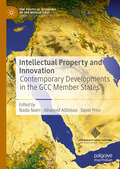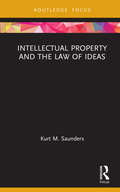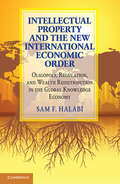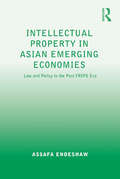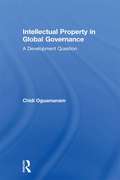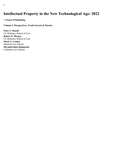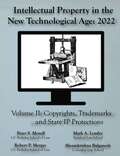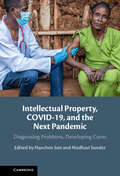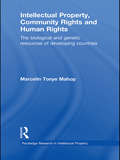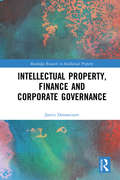- Table View
- List View
Intellectual Property and Information Control: Philosophic Foundations and Contemporary Issues
by Adam MooreComputer technology and the proliferation of digital networks have radically altered how ideas and information are gathered and manipulated and generated new conflicts between public use and private rights. These conflicts raise serious problems: Are abstract ideas and information proper subjects of ownership? What role should privacy rights play? How does the violation of intellectual property rights compare morally to the violation of physical property rights? Now available in paperback, Intellectual Property and Information Control provides answers and strategies for dealing with these and other questions while mounting a philosophical defense of rights to intellectual and intangible property.As the book shows, a policy that allows too much access may stymie innovation and cause individuals to isolate themselves. At the other extreme, huge, multinational corporations may hold as intangible property vast amounts of knowledge, including sensitive personal information. Through discussions of patent law, fair use, and practical problems such as privacy in the workplace, Moore demonstrates that intellectual and intangible property rights exist along with privacy rights. The latter will sometimes constrain what can be done with the former.
Intellectual Property and Innovation Protection: New Practices and New Policy Issues
by Rémi LallementThis book analyses the various ways in which intellectual property (IP) operates in relation to innovation activity. It reflects on the “classical” issues of the IP system related to the necessity of protecting risky and often costly investments undertaken by firms and others players involved in the innovation process. Beyond this, it stresses the numerous challenges addressed by contemporary technological and societal change, especially in a world where the digital revolution is rapidly transforming the way in which innovation is organized. In this context, the new corporate IP and innovation practices call for responses on the part of public policies.
Intellectual Property and Innovation: Contemporary Developments in the GCC Member States (The Political Economy of the Middle East)
by David Price Alhanoof AlDebasi Nadia NaimThis book examines the notion and understanding of innovation and knowledge societies as they particularly apply to the Gulf states and their broad range of communities. Key to this examination will be the role that intellectual property - its promotion and protection – plays in fostering both innovation and the knowledge society. In brief, innovation, knowledge, society, emerging technology, economic growth and intellectual property are intertwined and inseparable. Unique to the GCC, is the constitutional significance of Islamic Law and the book discusses intellectual property growth in line with economic developments in the region and reflects on Islamic Finance Law.
Intellectual Property and Traditional Knowledge in the Global Economy: Translating Geographical Indications for Development (Routledge Research in Intellectual Property)
by Teshager W. DagneArising from recent developments at the international level, many developing countries, indigenous peoples and local communities are considering using geographical indications (GIs) to protect traditional knowledge, and to promote trade and overall economic development. Despite the considerable enthusiasm over GIs in diverse quarters, there is an appreciable lack of research on how far and in what context GIs can be used as a protection model for traditional knowledge-based resources. This book critically examines the potential uses of geographical indications as models for protecting traditional knowledge-based products and resources in national and international intellectual property legal frameworks. By analysing the reception towards GIs from developing countries and advocates of development in the various legal and non-legal regimes (including the World Trade Organization, World Intellectual Property Organization, and the Convention on Biological Diversity and the Food and Agricultural Organization), the book evaluates the development potential of GIs in relation to ensuing changes in international intellectual property law in accommodating traditional knowledge. Teshager W. Dagne argues for a degree of balance in the approach to the implementation of global intellectual property rights in a manner that gives developing countries an opportunity to protect traditional knowledge-based products. The book will be of great interest and use to scholars and students of intellectual property law, public international law, traditional knowledge, and global governance.
Intellectual Property and the Brain: How Neuroscience Will Reshape Legal Protection for Creations of the Mind
by Mark BartholomewAlthough legal scholars have begun to explore the implications of neuroscientific research for criminal law, the field has yet to assess the potential of such research for intellectual property law – a legal regime governing over one-third of the US economy. Intellectual Property and the Brain addresses this gap by showing how tools meant to improve our understanding of human behavior inevitably shape the balance of power between artists and copyists, businesses and consumers. This first of its kind book demonstrates how neuroscience can improve our flawed approach to regulating creative conduct and commercial communications when applied with careful attention to the reasons that our system of intellectual property law exists. With a host of real-life examples of art, design, and advertising, the book charts a path forward for legal actors seeking reforms that will unlock artistic innovation, elevate economic productivity, and promote consumer welfare.
Intellectual Property and the Common Law
by Shyamkrishna BalganeshIn this volume, leading scholars of intellectual property and information policy examine what the common law - a method of reasoning, an approach to rule making, and a body of substantive law - can contribute to discussions about the scope, structure and function of intellectual property. The book presents an array of methodologies, substantive areas and normative positions, tying these concepts together by looking to the common law for guidance. Drawing on interdisciplinary ideas and principles that are embedded within the working of common law, it shows that the answers to many of modern intellectual property law's most puzzling questions may be found in the wisdom, versatility and adaptability of the common law. The book argues that despite the degree of interdisciplinary specialization in the field, intellectual property is fundamentally a creation of the law; therefore, the basic building blocks of the law can shed important light on what intellectual property can and should (and was perhaps meant to) be.
Intellectual Property and the Human Rights of Companies in Europe
by Aurora PlomerThe aim of this book is to investigate the history and rationale for the paradoxical extension of human rights to companies in the European Convention on Human Rights (ECHR) and to analyse the Court's jurisprudence on protection of companies' intellectual property in this light. The study shows how, before the adoption of the ECHR, the concepts of legal personality and possessions functioned as legal fictions in European civil and common law to facilitate ownership and sale of tangible and intangible property, shares, debts, securities and intellectual property. The Court's construction of the ambiguous text of Article 1 of the First Protocol and its application to corporate intellectual property rights is reviewed in this light and shown to have been initially anchored in the legal fictions of national laws and later expanded and reinforced by European Union law.
Intellectual Property and the Law of Ideas (Routledge Research in Intellectual Property)
by Kurt SaundersIdeas are the fuel of industry and the entertainment business. Likewise, manufacturers receive suggestions for new products or improvements to existing products, and retailers frequently receive ideas for new marketing campaigns. Many ideas are not new and may be used by anyone without the risk of incurring any legal liability, but some ideas are novel and valuable. If the originator of a potentially useful idea does not have the financial resources to exploit the idea, he or she may submit it to another, with the expectation of receiving compensation if the idea is used. Although an extensive body of intellectual property law exists to protect the rights of inventors, authors, and businesses that own valuable brands or confidential proprietary information, raw ideas receive no protection. Nevertheless, the originator of a potentially useful and marketable idea is not without legal recourse. The courts have developed, through a long line of common law precedents, legal protection for novel and concrete ideas under certain circumstances. The originator of an idea can rely on contract law, whereby the recipient may expressly or impliedly agree to pay for the idea. Alternatively, if the idea is disclosed in confidence, its unauthorized use by the recipient allows the originator of the idea to recover compensation. Finally, some courts have treated the ownership of ideas as quasi-property rights.
Intellectual Property and the New International Economic Order: Oligopoly, Regulation, And Wealth Redistribution In The Global Knowledge Economy
by Sam F. HalabiIn economic sectors crucial to human welfare—agriculture, education, and medicine—a small number of firms control global markets, primarily by enforcing intellectual property (IP) rights incorporated into trade agreements made in the 1980s onward: such rights include patents on seeds and medicines, copyrights for educational texts, and trademarks in consumer products. According to conventional wisdom, these agreements likewise ended hopes for a “New International Economic Order,” under which wealth would be redistributed from rich countries to poor. <P><P>In this book, Sam Halabi turns this conventional wisdom on its head by demonstrating that the New International Economic Order never faded, but rather was redirected by other treaties, formed outside the nominally economic sphere, that protected poor countries' interests in education, health, and nutrition, and resulted in redistribution and regulation. <P>This illuminating book should be read by anyone seeking a nuanced view of how IP is shaping the global knowledge economy.<P>Identifies a coherent and unified way of looking at seemingly disparate phenomena in international economic law.<P> Explores a largely neglected dimension of the global wealth inequality debate.<P> Addresses complex issues in international economics and international relations without resorting to technical language or jargon.
Intellectual Property at the Edge
by Jane C. Ginsburg Rochelle Cooper DreyfussIntellectual Property at the Edge addresses both newly formed intellectual property rights and those which have lurked on the fringes, unadmitted to the established IP canon. It provides a basis for studying and discussing the history of these emerging rights as well as their relationship to new technological opportunities and to the changing importance of innovation and creative production in the global economy. In addition to addressing the scope of new rights, it also focuses on new limitations to patent, copyright and trademark rights that spring from similar changes. All of these developments are examined comparatively: for each new development, scholars in two jurisdictions analyse the evolving legal norm. In several instances, the first of the paired authors writes from the perspective of the legal system in which the doctrine emerged, and the second addresses its reception in her jurisdiction.
Intellectual Property in Asian Emerging Economies: Law and Policy in the Post-TRIPS Era
by Assafa EndeshawThis book critically reviews the recurrent debate on Intellectual Property law and policy in developing countries carried out in the last decade. It identifies the still unresolved policy issues and proposes alternative approaches that resonate with the needs for transformation of the economic and social reality of developing countries. Focusing on emerging economies in Asia, the work draws the wider lessons to be learnt by researchers, policy makers, legislators and the business sector in general and concludes by putting forward proposals for reform.
Intellectual Property in China: Legal And Tax Implication (China Law, Tax & Accounting)
by Giovanni Pisacane Daniele ZibettiThis book offers a guide to intellectual property law in the People’s Republic of China. It simplifies the complex and rather atypical judicial system and uses practical cases to demonstrate how Chinese IP law really works. The IP system is evolving rapidly in China, with the adoption of numerous new laws and regulations, more sophisticated and detailed than their predecessors. As such the book provides an up-to-date overview of the field, including legal protection and tax assessment practices in China, focusing especially on matters regarding trademark, patent and copyright law and its protection. It also covers Chinese IP in the international context, discussing all the relevant international organizations and treaties. Furthermore, by presenting the right mix of practice and theory, and examining the best-known IP infringement cases in China, it allows readers to gain an understanding of potential IP infringement risks and ways to protect their own legal rights and interests. In addition, it provides insights into the important area of valorization and fiscal management of IP in China. Based on written law and regulations as well as the authors’ expertise, it is a valuable resource for foreign lawyers and foreign companies alike.
Intellectual Property in Consumer Electronics, Software and Technology Startups
by Jr. Gerald B. Halt John C. Donch Amber R. Stiles Robert FesnakThis book provides a comprehensive guide to procuring, utilizing and monetizing intellectual property rights, tailored for readers in the high-tech consumer electronics and software industries, as well as technology startups Numerous, real examples, case studies and scenarios are incorporated throughout the book to illustrate the topics discussed Readers will learn what to consider throughout the various creative phases of a product's lifespan from initial research and development initiatives through post-production Readers will gain an understanding of the intellectual property protections afforded to U. S. corporations, methods to pro-actively reduce potential problems, and guidelines for future considerations to reduce legal spending, prevent IP theft, and allow for greater profitability from corporate innovation and inventiveness.
Intellectual Property in Global Governance: A Development Question (Routledge Research in Intellectual Property)
by Chidi OguamanamIntellectual Property in Global Governance critically examines the evolution of international intellectual property law-making from the build up to the TRIPS Agreement, through the TRIPS and post-TRIPS era. The book focuses on a number of thematic intellectual property issue linkages, exploring the formal and informal institutional interactions and multi-stakeholder holder intrigues implicated in the global governance of intellectual property. Using examples from bio-technology, bio-diversity, bio-prospecting and bio-piracy it investigates the shift or concentration in the focus of innovation from physical to life sciences and the ensuing changes in international intellectual property law making and their implications for intellectual property jurisprudence. It examines the character of the reception, resistance and various nuanced reactions to the changes brought about by the TRIPS Agreement, exploring the various institutional sites and patterns of such responses, as well as the escalation in the issue-linkages associated with the concept and impact of intellectual property law. Drawing upon multiple methodological approaches including law and legal theory; regime theory, globalization and global governance Chidi Oguamanam explores the intellectual property dynamics in the "Global Knowledge Economy" focusing on digitization and information revolution phenomenon and the concept of a post-industrial society. The book articulates an agenda for global governance of intellectual property law in the 21st century and speculates on the future of intellectual property in North-South relations.
Intellectual Property in Innovationskooperationen: Zuordnung von IP in unternehmensübergreifenden Prozessen der Innovationserstellung
by Michael HorethDas Management und der Schutz des geistigen Eigentums eines Unternehmens (Intellectual Property – IP) sind besonders für innovative Unternehmen von signifikanter, strategischer Bedeutung. Angesichts der zunehmenden Interaktionen und Kooperationen von Unternehmen bei der Innovationserstellung mit externen Dritten, erscheint der adäquate Einsatz juristischer (z.B. Patent, Design oder Marke) und faktischer Schutzinstrumente unabdingbar, um die Wettbewerbsfähigkeit eines Unternehmens zu erhalten oder sogar nachhaltig zu verbessern. Der effektive Umgang mit unternehmerischem IP im (kooperativen) Innovationsprozess ist, bedingt durch die Interdisziplinarität, jedoch mit Herausforderungen für das Management verbunden.Dr. Michael Horeth vermittelt ein weitreichendes Bild betriebswirtschaftlicher und juristischer Aspekte, das eine umfassende Perspektive auf die unternehmerische Innovationserstellung und die damit einhergehenden Aufgaben und Herausforderungen ermöglicht. Er bietet dabei fundierte Einblicke hinsichtlich der Entstehung und des Umgangs mit IP in (kooperativen) Innovationsprozessen. Besonderer Fokus wird dabei auf ein ganzheitliches Portfolio von Schutzinstrumenten für Innovationen, die Zuordnung der Rechtspositionen und die Gestaltung des Innovationsprozesses gelegt.
Intellectual Property in Russia (Routledge Studies in the Economics of Business and Industry)
by Anna S. Vlasova Natalia M. UdalovaIntellectual property rights are essential for a firm’s competitive edge and success and form the significant assets for many firms. The authors of this book argue that intellectual property is a complex phenomenon, which inevitably requires a combination of both economic and legal considerations, because the lack of understanding of the mechanisms for the protection and preservation of IP can serve to undermine any of the potential economic benefits. The book outlines the opportunities that can be derived from the use of IP in business and also identifies the rules necessary for their implementation. It offers a comprehensive, systemic research of intellectual property based on the most up-to-date legislation and cases of IP use in Russia. Such an approach will allow readers to fully understand the peculiarities of IP as a special phenomenon of the Russian market. There is a good balance between theoretical knowledge and practical implementation, and the plain language and unique approach to structuring information make the book accessible and easy to understand. It contains a special glossary of terms to facilitate the understanding of the material presented in the book. Although the book looks specifically at the Russian case, it will have international appeal, since intellectual property, by its very nature, has become a transnational phenomenon. Moreover, the international regulatory framework provides for the similarity of legal regulation of IP. The book will find an audience among researchers concerned with the economics and law of intellectual property, as well as, policymakers and practitioners involved in business IP.
Intellectual Property in the New Technological Age 2017 (Volume I: Perspectives, Trade Secrets and Patents)
by Mark A. Lemley Peter S. Menell Robert P. MergesLaw school case/text book covering intellectual property law. Volume I surveys philosophical perspectives, trade secret law, and patent law.
Intellectual Property in the New Technological Age: Copyrights, Trademarks and State IP Protections
by Mark A. Lemley Peter S. Menell Robert P. MergesIntellectual Property in the New Technological Age provides an in-depth survey of the rapidly evolving field of intellectual property law. Volume I covers philosophical perspectives, trade secret law, and patent law. Volume II covers copyright law, trademark law, and state intellectual property law protections.
Intellectual Property in the New Technological Age: Vol. I Perspectives, Trade Secrets And Patents
by Mark A. Lemley Shyamkrishna Balganesh Peter S. Menell Robert P. MergesIntellectual Property in the New Technological Age provides an in-depth survey of the rapidly evolving field of intellectual property law. Volume I covers philosophical perspectives, trade secret law, and patent law. Volume II covers copyright law, trademark law, and state intellectual property law protections.
Intellectual Property in the New Technological Age: Vol. II, Copyrights, Trademarks and State IP Protections
by Mark A. Lemley Shyamkrishna Balganesh Peter S. Menell Robert P. MergesIntellectual Property in the New Technological Age provides an in-depth survey of the rapidly evolving field of intellectual property law. Volume I covers philosophical perspectives, trade secret law, and patent law. Volume II covers copyright law, trademark law, and state intellectual property law protections.
Intellectual Property, COVID-19 and the Next Pandemic: Diagnosing Problems, Developing Cures
by Madhavi Sunder Haochen SunThis volume assesses the role of intellectual property in pandemic times through lessons learned from COVID-19. Authored by an international roster of experts, chapters diagnose causes for the inequitable distribution of lifesaving COVID-19 vaccines and offer concrete suggestions for reform. From delinking vaccine development from monopoly rights in technology, to enhanced legal requirements under national and international law for sharing publicly funded technologies, to requiring funding from rich nations to former colonies to build local vaccine manufacturing capacity in low and middle-income countries (including those in Africa), this work highlights timely IP reforms that prepare us for the next pandemic. This title is also available as Open Access on Cambridge Core.
Intellectual Property, Community Rights and Human Rights: The Biological and Genetic Resources of Developing Countries (Routledge Research in Intellectual Property)
by Marcelin Tonye MahopThis book considers the issue of biodiversity in developing countries in relation to intellectual-property rights, community rights and human rights. Drawing together a number of case studies of developing countries rich in biological and genetic resources including India, South Africa and Brazil, the book examines the access to PGRs and their utilizations in the contexts of scientific and commercial oriented activities pursued both in the source and user countries. Exploring how community rights are protected in national biodiversity-related regulations and some international legal instruments, Marcelin Tonye Mahop also discusses the relationship between community rights and human rights in the context of biodiversity. The book looks at the issue of bio-piracy, asking whether this phenomenon should only be seen as a North–South clash, whereby biodiversity rich countries of the Southern Hemisphere blame developed countries and their actors as its principal perpetrators. While recognizing that developing countries' actors play a role in this bio-piracy phenomenon, the book goes on to suggest alternative measures for the legal protection of community rights at the national level with the possibility of national and international enforceability. Essential reading for students and scholars of intellectual-property rights, biodiversity regulations and human rights, this book will also be of great value to researchers and members of professional organizations working in these subject areas. National and regional negotiators in the international processes dealing with the issues covered in the book will find it a useful tool that can help them to understand various facets of these processes.
Intellectual Property, Design Innovation, and Entrepreneurship (Springer Series in Design and Innovation #11)
by Matthias HillnerThis book focuses on intellectual property (IP) in the context of product innovation and design-led start-up management. A distinguished feature is that it analyses innovation-related scenarios within their continuously changing contexts. IP is discussed in relation to the way in which its value changes over time as a venture matures. The book reveals how IP strategies can enhance a start-up’s survival prospects and its growth potential if they are connected systematically to other business development attributes. Being mainly addressed to enterprising designers, it may also support business administration programmes, innovation hubs, design educators, incubator managers, as well as business coaches and IP attorneys who support creatives and inventors. All in all, this book offers a unique and timely strategic guidance in the field of design and innovation management. “Design and design rights have long been overlooked in the plethora of studies on the links between IPR and innovation. Matthias Hillner’s thoughtful and eloquent journey provides a contemporary and meaningful analysis which will no doubt assist governments, economists, academics and designers’ better understanding of design in the context of successful business strategies and IPR. Given design’s significant contribution to global economies, I am confident it will offer much needed guidance.”Dids Macdonald OBE, founder CEO of Anticopying in Design (ACID)"This is an immensely practical book for designers and entrepreneurs who want to understand the issues of IP, product innovation, and business development. With clear explanations, many vivid examples, and strategically useful tips, it will be a valuable resource for creative minds at all levels of experience. A serious book but written with a sensitive touch on how to protect new ideas." Richard Buchanan, Professor of Design, Management, and Innovation, Weatherhead School of Management, Case Western Reserve University
Intellectual Property, Finance and Corporate Governance (Routledge Research in Intellectual Property)
by Janice DenoncourtIP law has evolved from being a little pool to a big ocean. Corporate governance needs to respond to society’s rising expectations of directors and boards as the impact of the global intellectual property ecosystem is felt. How can a responsible corporate culture of IP transparency be stimulated to create a rosy future to connect corporate communication with the desires of shareholders, investors and other stakeholders? The astonishing lack of material quantitative and qualitative information companies report about their IP assets makes it difficult for shareholders and other stakeholders to assess directors’ stewardship of those assets – a pressing corporate governance issue in the 21st century. This book advances IP reporting in alignment with the key corporate governance principles of transparency and disclosure. It analyses the juncture between the IP ecosystem; corporate finance and accounting for intangibles; and corporate governance. Patents, mini-case studies and an original business triage style model for assessing IP disclosures are used to illustrate the gaps corporate governance theory needs to address. Focussing on the common law tradition of corporate governance in England and Wales, intangibles and IP reporting developments in other jurisdictions are also explored.
Intellectual Property, Indigenous People and their Knowledge
by Peter DrahosAfter colonization, indigenous people faced an extractive property rights regime for both their land and knowledge. This book outlines that regime, and how the symbolic function of international intellectual property continues today to assist states to enclose indigenous peoples' knowledge. Drawing on more than 200 interviews, Peter Drahos examines the response of indigenous people to the colonizer's non-developmental property rights. The case studies reveal how they have adapted to the state's extractive order through a process of regulatory bricolage. In order to create a new developmental future for themselves, indigenous developmental networks have been forged - high trust networks that include partnerships with science. Intellectual Property, Indigenous People and their Knowledge argues for a developmental intellectual property order for indigenous people based on a combination of simple rules, principles and a process of regulatory convening.


